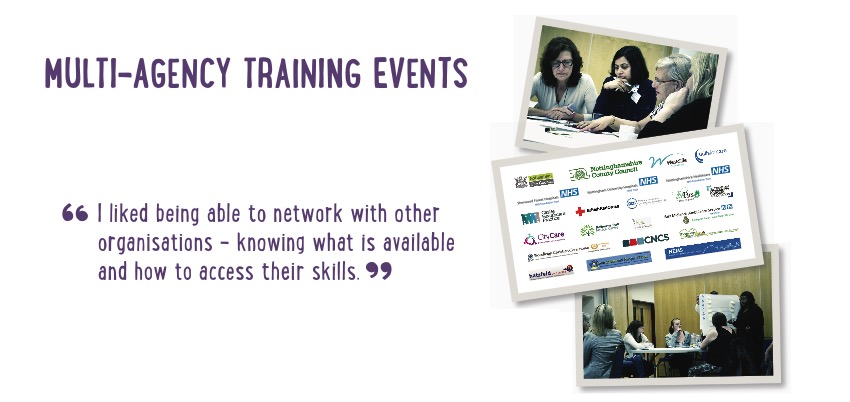Designed for a range of group sizes, these whole day events are the core training for staff involved in supporting older people with frailty to self-care. The shorter sessions – Frailty & Supported Self-care awareness and Multi-agency case based learning events – provide an alternative for individuals that are not able to access whole day training due to staffing or other constraints. The half-day Person-centred care sessions also provide an alternative shorter form event and have been combined with Local Trainer events to develop a cohort of local champions.
Main components of the day
- Multi-agency. Participants work in multi-agency, multi-professional teams throughout a very interactive day. Supported self-care themes – empowerment, motivation and capability building – run throughout. Morning sessions focus upon understanding frailty, skills for supported self-care, and identifying ‘helps and hindrances’ to joint-working. Afternoon sessions cover practical application through interactive case-based exercises.
- Frailty fulcrum. This new model articulates the complex nature of frailty. By exploring the balance and interaction of all the different aspects of an older person’s life, care professionals can use this model to identify opportunities to build resilience and thereby improve quality of life for older people with frailty. The model is introduced through a short animation and underpins the holistic approach to assessment used throughout the training day.
- Supported self-care plan. Too often our systems of care can overlook what is really important to individuals, particularly older people living with frailty. The toolkit and training recognises this. The process of supported self-care planning explores the importance of promoting independence and individual choice, and of accepting and managing risk along the way. The person-centred, holistic planning template used in the training empowers care professionals to support practical changes in an individual’s life by applying their knowledge and skills to help identify individual goals and to create a ‘plan on a page’.
- FrailtySIM – the virtual reality frailty simulation. How does it feel to be an older person with frailty living at home? Using a newly developed virtual reality simulation, participants are put in the shoes of that person. This part of the training helps develop empathy with those whom we care for, as well as building awareness and observational skills, and introducing the related case study exercise.
- Co-designed case study exercises. The Toolkit and the Training events have been co-designed with a small number of older people living with frailty. These individuals and their families have kindly shared their stories, creating person-centred case studies that bring to life the principles and the tools. They highlight the practical application of supported self-care at different stages of frailty and settings of care. Through the training events they provide memorable experiences of how the Frailty Fulcrum and Supported Self-Care Plan work together to optimise an individual’s quality of life.
Learning outcomes
- To have an understanding of frailty, its dynamic nature and typical journeys of frailty;
- To have an understanding of the principles of self-care and integrated assessment in relation to older people with frailty;
- To have an understanding of the broader health care environment and where these fit together;
- To identify how the principles can be utilised to help enable older people with frailty, including those with dementia, to self-care;
- To identify how individuals in their care roles can help enable older people with frailty to self-care in the best way possible for them;
- To identify ways to work together in an integrated manner across roles and sectors;
- To identify the role of carers, family and friends in supporting self-care.
Outline agenda and timings
To find out more please contact help@frailtytoolkit.org
